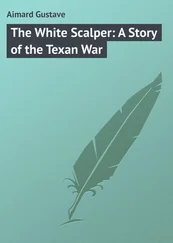Gustave Aimard - The Freebooters - A Story of the Texan War
Здесь есть возможность читать онлайн «Gustave Aimard - The Freebooters - A Story of the Texan War» — ознакомительный отрывок электронной книги совершенно бесплатно, а после прочтения отрывка купить полную версию. В некоторых случаях можно слушать аудио, скачать через торрент в формате fb2 и присутствует краткое содержание. Жанр: foreign_prose, на английском языке. Описание произведения, (предисловие) а так же отзывы посетителей доступны на портале библиотеки ЛибКат.
- Название:The Freebooters: A Story of the Texan War
- Автор:
- Жанр:
- Год:неизвестен
- ISBN:нет данных
- Рейтинг книги:3 / 5. Голосов: 1
-
Избранное:Добавить в избранное
- Отзывы:
-
Ваша оценка:
- 60
- 1
- 2
- 3
- 4
- 5
The Freebooters: A Story of the Texan War: краткое содержание, описание и аннотация
Предлагаем к чтению аннотацию, описание, краткое содержание или предисловие (зависит от того, что написал сам автор книги «The Freebooters: A Story of the Texan War»). Если вы не нашли необходимую информацию о книге — напишите в комментариях, мы постараемся отыскать её.
The Freebooters: A Story of the Texan War — читать онлайн ознакомительный отрывок
Ниже представлен текст книги, разбитый по страницам. Система сохранения места последней прочитанной страницы, позволяет с удобством читать онлайн бесплатно книгу «The Freebooters: A Story of the Texan War», без необходимости каждый раз заново искать на чём Вы остановились. Поставьте закладку, и сможете в любой момент перейти на страницу, на которой закончили чтение.
Интервал:
Закладка:
But the war then changed its character: the Texans, nearly all North Americans, skilful hunters, indefatigable marchers, and marksmen of proverbial reputation, broke up into small bands, and instead of offering the Mexican troops a front, which would have enabled them to outmanoeuvre and crush them, they began a hedge war, full of tricks and ambushes, after the manner of the Vendeans, the first result of which was to enormously fatigue the soldiers by compelling them to make continual marches and counter-marches, and produced among them discouragement and demoralization, by compelling to fight against a shifting foe, whom they knew to be everywhere, and yet could never seize.
The position became more and more critical. These outlaws, branded with the epithets of bandits, border ruffians, and freebooters, whom they affected to confound with the villains who congregate in these countries, and whom they obstinately treated as such by granting them no quarter, and shooting them without trial wherever they were captured: these men, now disciplined, hardened, and strong in the moral support of their fellow citizens, who applauded their successes, and put up vows for them, had boldly raised the flag of Texan independence, and after several engagements, in which they decimated the troops sent against them, compelled the latter to recognize them as the avowed defenders of an honourable cause.
Among the numerous generals of the republic, the president at length chose the only man capable of repairing the successive disasters undergone by the government. General Don José Maria Rubio was invested with the supreme command of the troops detached to act against Texas. This choice was most lucky; the general, an honest man and brave soldier, was incapable of selling himself, however great the price offered. Hence there was no reason to fear treachery from him, from which others, less susceptible or more avaricious than he was, had not recoiled. As an old soldier of the war of Independence, and ex-guerilla, Don José Maria was thoroughly conversant with all the tricks, and was the very man to fight with advantage against the foes that awaited him.
Unfortunately, this selection was made very late. Still, the General, while perfectly comprehending the immense responsibility he assumed, accepted without a murmur the rude task imposed on him. Certain men have the incontestable privilege of being born for the positions they occupy; their intellect seems to grow with the situation; made for great things, they ever remain on a level with events, whatever the nature of the latter may be. The General possessed this precious faculty; at the first glance he judged his enemies with that coolness which renders old soldiers so strong, and his plan was formed in a few minutes.
He immediately changed the tactics employed by his predecessors, and adopted a system diametrically opposite. Instead of fatiguing his troops by purposeless marches which had no result, he seized on the strongest positions, scattered his troops through cantonments, where they supported each other, and in case of need could all he assembled under his orders within four-and-twenty hours.
When these precautions were taken, still keeping his forces in hand, he prudently remained on the defensive, and instead of marching forward, watched with indefatigable patience for the opportunity to fall on the enemy suddenly and crush him.
The Texan Chiefs soon comprehended all the danger of these new and skilful tactics. In fact, they had changed parts; instead of being attacked, the insurgents were obliged to become the assailants, which made them lose all the advantages of their position, by compelling them to concentrate their troops, and make a demonstration of strength, contrary to their usual habits of fighting.
To the young officers who murmured at the plan adopted by the general, and made sarcastic remarks on his prudence, the latter replied with a smile that there was no hurry, that war was a game of skill in which the cleverest man won; and that he must not, for the sake of little lustre, let himself be led away to compromise the success of an enterprise which, with a little patience, must lead to certain success. The result proved that the general reasoned correctly, and that his plan was good.
The insurgents, reduced to inactivity by the system the new Chief of the Mexican army adopted, tried several times to attack his entrenchments, and draw him out; but the general contented himself with killing as many of them as he could, and would not move a step forward.
The conducta de plata intrusted to Captain Melendez had an immense importance in the eyes of the needy government at the capital; the dollars must at all hazards reach Mexico in safety; the more so, because for some time past the arrival of coin from Texas had become desperately irregular, and threatened to leave off altogether ere long.
General Rubio found himself reluctantly compelled to modify temporarily the line he had traced; he did not doubt that the insurgents, advised of the passage of the conducta, would make the greatest efforts to intercept and seize it, for they also suffered from a great want of money, and the millions sent to Mexico were of the utmost importance to them. Hence their plans must be foiled, and the conducta saved. For this purpose the General collected a large body of troops, placed himself at their head, and advanced by forced marches to the entrance of the defile, where, from the reports of his spies, he knew that the insurgents were ambuscaded; then, as we have seen, he sent off a sure man (or whom he supposed to be) to Captain Melendez, to warn him of his approach, and put him on his guard.
We have narrated in the "Border Rifles" what took place, and how truly worthy the General's express was of the confidence placed in him.
The Mexican camp stood in the centre of a beautiful plain, facing the defile through which the conducta must pass, according to the General's instructions. It was evening, and the sun had set for about an hour. Don José Maria, rendered anxious by the Captain's delay, and beginning to suspect a mishap, had sent off scouts in different directions to bring him news, and a prey to an agitation, which each moment that passed augmented, was walking anxiously about his tent, cursing and swearing in a low voice, frowning and stopping every now and then to listen to those thousand noises which arise at night without apparent cause, and pass as if borne on the wings of the Djinns.
General Don José Maria Rubio was still a young man; he was about forty-two, though he seemed older, through the fatigues of a military life, which had left rude marks on his martial and open countenance; he was tall and well-built; his muscular limbs, his wide and projecting chest denoted great vigour; and though his close-shaven hair was beginning to turn grey, his black eye had a brilliancy full of youth and intelligence.
Contrary to the habits of Mexican general officers, who, under all circumstances, make a great display of embroidery, and are gilded and plumed like charlatans, his uniform had a simplicity and severity which added to his military appearance, and gave him that aspect of reflection and majesty which is so befitting the chief of an army.
A sabre and a pair of holster pistols were carelessly thrown across a map on the table in the centre of the room, over which the General frequently bent in his agitated walk. The gallop of a horse, at first distant, but which rapidly drew nearer, was heard. The sentinel outside the tent challenged, "Who goes there?"
The horseman stopped, leapt to the ground, and a moment later the curtain of the tent was thrust aside, and a man appeared.
It was Captain Don Juan Melendez.
"Here you are, at last!" the General exclaimed, as his countenance grew brighter.
But on noticing the impression of sorrow spread over the officer's features, the General, who had walked two steps toward him, stopped, and his face again assumed an anxious look.
Читать дальшеИнтервал:
Закладка:
Похожие книги на «The Freebooters: A Story of the Texan War»
Представляем Вашему вниманию похожие книги на «The Freebooters: A Story of the Texan War» списком для выбора. Мы отобрали схожую по названию и смыслу литературу в надежде предоставить читателям больше вариантов отыскать новые, интересные, ещё непрочитанные произведения.
Обсуждение, отзывы о книге «The Freebooters: A Story of the Texan War» и просто собственные мнения читателей. Оставьте ваши комментарии, напишите, что Вы думаете о произведении, его смысле или главных героях. Укажите что конкретно понравилось, а что нет, и почему Вы так считаете.












